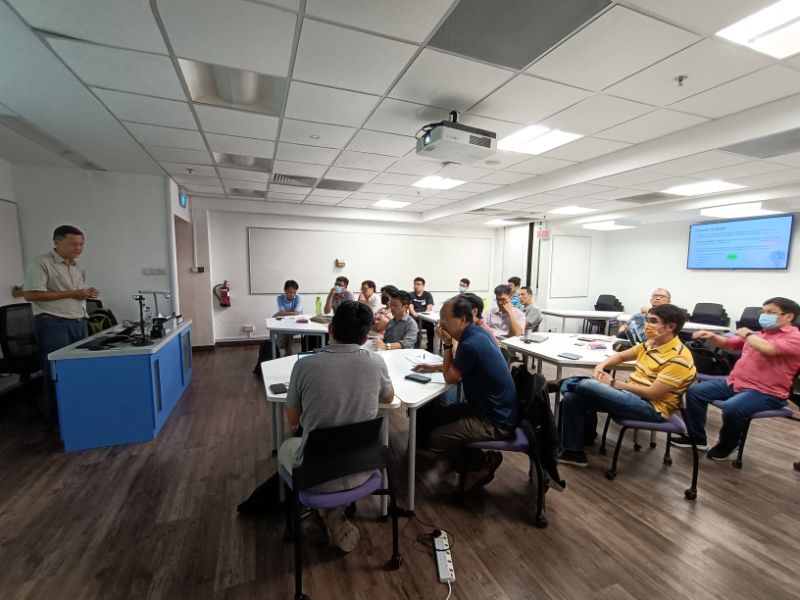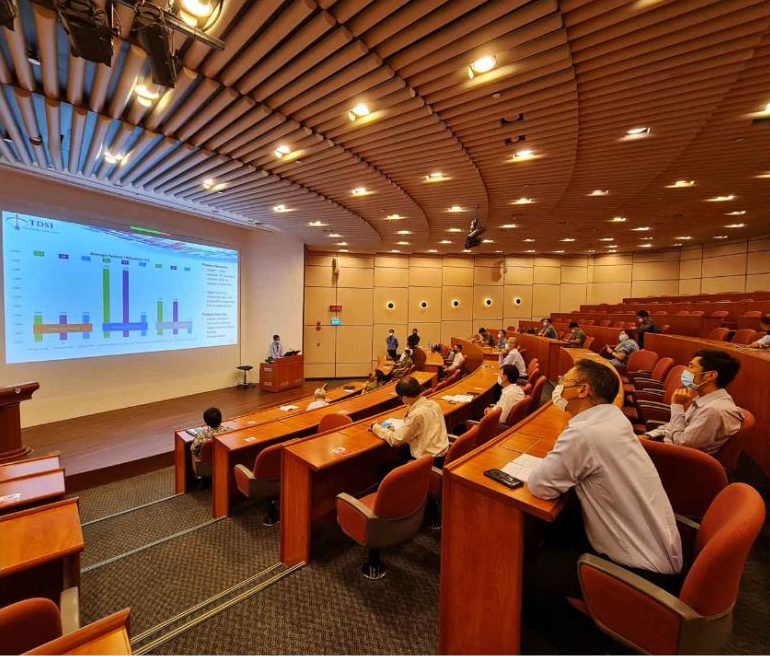Graduate Certificate Programmes
About Stackable Programmes
The TDSI Stackable Graduate Certificate Programmes in Digital Technologies and Systems Engineering, leading to the NUS Master of Defence Technology and Systems (MDTS), are designed to provide professionals with the necessary skills and knowledge to thrive in the ever-evolving digital landscape and concurrently, meet the industries’ growing demand for systems engineering expertise. Courses in respective programmes will provide comprehensive insights into various aspects of digital technologies, systems engineering and their applications.
What we offer
Graduate Certificate in Digital Technologies

DTS 5732 Artificial Intelligence & Data Analytics
This is an introductory course to artificial intelligence (AI) and data analytics (DA). It covers various topics of AI and DA. The AI topics include heuristic search, constraint satisfaction, logic and inference, and natural language processing. The DA topics include data preprocessing, data visualization, classification, model evaluation, decision trees, neural networks, deep learning, association analysis, and clustering.
DTS 5735 Cybersecurity
This course introduces cybersecurity concepts and their applications. It aims to illustrate how systems can fail under malicious activities, and how the threats can be mitigated and managed. It covers both the technical and management aspects in cybersecurity. Topics include cryptography, communication security, system security, policy making human factors, etc. Applications such as security operations centres, AI and case studies on well-known incidents will be used to reinforce the learning of various concepts.
And 1 elective course from MDTS list of courses.
DTS5701 Large Scale Systems Engineering
Large Scale Systems Engineering deals with the complexities of large-scale systems. The Systems Approach and Systems Engineering methodologies are used by the students to understand the key issues in the planning, design and management of large scale systems. The aim of this course is to help students learn about Large Scale Systems Engineering (LSSE) with theories, stories and case studies on how systems are planned and implemented. By the end of the course, students are expected to be able to analyze and synthesize systems and design large-scale projects using the LSSE framework taking into consideration their goals, boundaries, stakeholders, complexities, tradeoffs, risks and unintended consequences.
DTS5703 Operations Research
This is an introductory course to operations research which will cover both deterministic and stochastic models for effective decision-making. Topics include mathematical programming (overview on models building and sensitivity analysis; computer-based solutions), multi-criteria decision analysis, reliability and maintenance, queueing theory and simulation. Relevant cases on military applications will be discussed.
And 1 elective course from MDTS list of courses.
Graduate Certificate in Systems Engineering

MDTS Elective Courses
This is an introductory module to operations research which will cover both deterministic and stochastic models for effective decision-making. Topics include mathematical programming (overview on models building and sensitivity analysis; computer-based solutions), multi-criteria decision analysis, reliability and maintenance, queueing theory and simulation. Relevant cases on military applications will be discussed.
The module introduces different modes of human robot interactions, methods for detecting humans, understanding human behaviors and intentions, and methods for human-robot coordination and collaboration. Human-robot interactions include physical and non-physical (e,g, social) interactions. Physical interactions include human assistance and wearable robotics. Non-physical interactions include natural language understanding, gestures and “body language”, and multi-modal interaction fusing different interaction modalities. Human-robot coordination and collaboration include human-robot handovers, robotic assistants and co-workers. User interface design for mutual communications between robot and humans is covered, including social interaction. Several applications and scenarios will be included.
This module introduces sensor and intelligence technologies and their applications in the operational context, mainly focusing on the most commonly deployed sensor technologies such as Radar and Electro-Optical (EO) sensors as well as established and emerging intelligence areas such as communications intelligence (COMINT), electronic intelligent (ELINT) and Open-Source Intelligence (OSINT).
The module covers basic linear algebra principles to provide the formalism to reveal coherent patterns and behaviours in data. We will introduce system identification methods, dimensionality reduction techniques, dynamical system theory, inverse problems in their Bayiesian form and machine learning techniques, with a special focus on neural networks. These will provide students with the necessary tools to analyze real-world datasets that are commonly found in practical engineering and scientific applications.
The module covers the principles, technologies and operational aspects of smart weapon systems e.g. guided weapons, precision munitions and unmanned vehicles (UxVs). The interplay of various sub-systems for target identification & tracking, guidance/navigation, command and control and their impact on mission effectiveness will be examined with consideration of counter-measures and counter-counter-measures. Additional topics include advanced concepts for autonomy, interoperability and teaming and cooperation. The course will include case studies of these weapon systems in actual combat.
The module covers basic linear algebra principles to provide the formalism to reveal coherent patterns and behaviors in data. We will introduce system identification methods, dimensionality reduction techniques, dynamical system theory, inverse problems in their Bayiesian form and machine learning techniques, with a special focus on neural networks. These will provide students with the necessary tools to analyze real-world datasets that are commonly found in practical engineering and scientific applications.
Large Scale Systems Engineering (LSSE) deals with the complexities of large-scale systems. The Systems Approach and Systems Engineering methodologies are used to understand and conceptualize the key issues in the planning, design and management of large-scale systems. The course aims to help students learn about LSSE with theories, stories and case studies on how systems are planned and implemented. By the end of the course, students are expected to be able to analyze and synthesize systems and design large-scale projects using the LSSE framework, taking into consideration their goals, boundaries, stakeholders, complexities, trade-offs, risks and unintended consequences.
This course provides the key underlying principles and concepts of C3 engineering and their application in the design, development and integration of C3 systems in modern armed forces. Using a systems engineering approach, the course will also enable participants to have a good appreciation of the key considerations and challenges as well as good engineering practices associated with C3 design and integration with sensor and weapon systems. Topics related to emerging trends, concepts and technologies will also be covered.
This is an introductory course to operations research which will cover both deterministic and stochastic models for effective decision-making. Topics include mathematical programming (overview on models building and sensitivity analysis; computer-based solutions), multi-criteria decision analysis, reliability and maintenance, queueing theory and simulation. Relevant cases on military applications will be discussed.
This is an introductory course to artificial intelligence (AI) and data analytics (DA). It covers various topics of AI and DA. The AI topics include heuristic search, constraint satisfaction, logic, and inference, and natural language processing. The DA topics include data preprocessing, data visualization, classification, model evaluation, decision trees, neural networks, deep learning, association analysis, and clustering.
This course introduces sensor and intelligence technologies and their applications in the operational context, mainly focusing on the most commonly deployed sensor technologies such as Radar and Electro-Optical (EO) sensors as well as established and emerging intelligence areas such as communications intelligence (COMINT), electronic intelligent (ELINT) and Open-Source Intelligence (OSINT).
The course covers the principles, technologies and operational aspects of smart weapon systems e.g. guided weapons, precision munitions and unmanned vehicles (UxVs). The interplay of various sub-systems for target identification & tracking, guidance/navigation, command and control and their impact on mission effectiveness will be examined with consideration of counter-measures and counter-counter-measures. Additional topics include advanced concepts for autonomy, interoperability and teaming and cooperation. The course will include case studies of these weapon systems in actual combat.
This course introduces cybersecurity concepts and their applications. It aims to illustrate how systems can fail under malicious activities, and how the threats can be mitigated and managed. It covers both the technical and management aspects in cybersecurity. Topics include cryptography, communication security, system security, policymaking, human factors, etc. Applications such as security operations centres, artificial intelligence and case studies on well-known incidents will be used to reinforce the learning of various concepts.
The course introduces different modes of human robot interactions, methods for detecting humans, understanding human behaviors and intentions, and methods for human-robot coordination and collaboration. Human-robot interactions include physical and non-physical (e,g, social) interactions. Physical interactions include human assistance and wearable robotics. Non-physical interactions include natural language understanding, gestures and “body language”, and multi-modal interaction fusing different interaction modalities. Human-robot coordination and collaboration include human-robot handovers, robotic assistants and co-workers. User interface design for mutual communications between robot and humans is covered, including social interaction. Several applications and scenarios will be included.
The course covers basic linear algebra principles to provide the formalism to reveal coherent patterns and behaviours in data. We will introduce system identification methods, dimensionality reduction techniques, dynamical system theory, inverse problems in their Bayiesian form and machine learning techniques, with a special focus on neural networks. These will provide students with the necessary tools to analyze real-world datasets that are commonly found in practical engineering and scientific applications.
The course covers basic linear algebra principles to provide the formalism to reveal coherent patterns and behaviors in data. We will introduce system identification methods, dimensionality reduction techniques, dynamical system theory, inverse problems in their Bayiesian form and machine learning techniques, with a special focus on neural networks. These will provide students with the necessary tools to analyze real-world datasets that are commonly found in practical engineering and scientific applications.
Note: EE courses are offered by the NUS Electrical and Computer Engineering department and ME courses are offered by NUS Mechanical Engineering department.
About Stackable Programmes
Participants who wish to continue their learning journey towards the Master of Defence Technology and Systems (MDTS) can complete up to 2 Graduate Certificate Programmes (total 24 units), and attain the remaining units through other MDTS courses or projects to meet the NUS graduation requirements.
The Next Step

Find out more!
Please refer to Frequently Asked Questions page for more information.

Interested in our courses?
Register your interest
with us now!
Learn with TDSI
- FOCUSED TEACHING with boutique class size teaching.
- SPECIALISED EDUCATION in Systems Thinking and Systems Engineering for defence and security.
- TAUGHT BY EXPERTS where participants/ students can learn with lecturers who are subject matter experts to enhance your knowledge, expertise and competencies to contribute to the ongoing digital transformation in Singapore and beyond.
